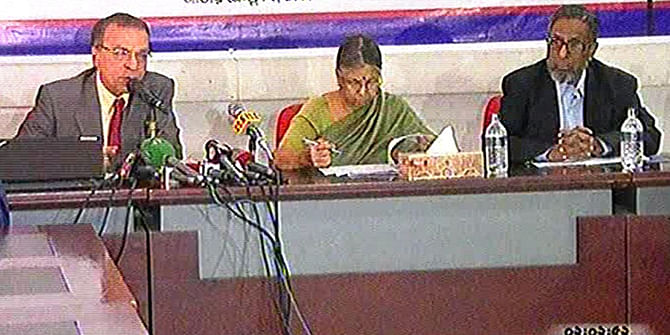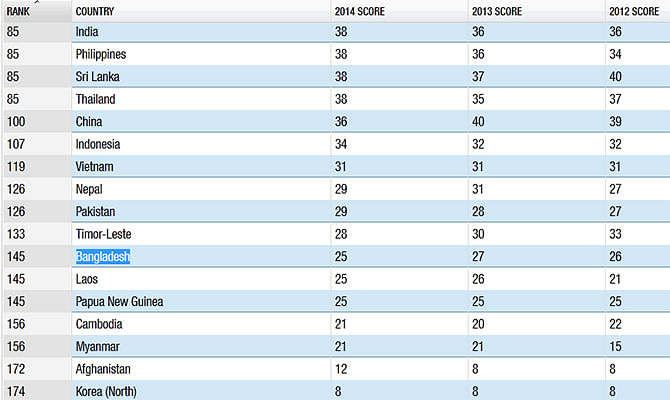Bangladesh 14th most corrupt country
Bangladesh 14th most corrupt country
'Influence on ACC and cubing its powers key reasons behind worsening situation'

In a slide of performance, Bangladesh has been ranked 14th in the global graft index, according to a Transparency International report.
The country scored only 25 out of 100 points, Transparency International Bangladesh (TIB) said while unveiling its in the Corruption Perception Index (CPI) for 2014 at a press conference at Jatiya Press Club in Dhaka today.
Last year, Bangladesh was ranked 16 on the index.
North Korea and Somalia jointly ranked top corrupt countries scoring eight points, according to the report of the Berlin-based corruption monitor.

Denmark appeared as the least corrupt country, scoring 92, followed by New Zealand and Finland, which scored 91 and 89 respectively.
In the list of least corrupt countries, Bangladesh positioned itself on the 145th rank out of 175 countries this year while it stood 136th last year.
According to the report, Bangladesh dropped off in the graft index as it failed to fulfill its promises towards curbing corruptions.
The report also identified political and administrative influences on the country's corruption watchdog -- Anti-Corruption Commission (ACC) -- and cubing its administrative power as key reasons behind the worsening situation.
The countries that ranked the same position along with Bangladesh are Guinea, Laos, Kenya and Papua New Guinea.
This year, the countries that ranked lower than Bangladesh include Central African Republic, Paraguay, Congo, Tajikistan, Chad, Cambodia, Myanmar, Zimbabwe, Burundi, Syria, Angola, Haiti, Venezuela, Yemen, Eritrea, Libya, Uzbekistan, Turkmenistan, Iraq, South Sudan, Afghanistan, Sudan with Somalia and North Korea jointly at the bottom.
TIB Executive Director Dr Iftekharuzzaman cited the survey findings and said that the government’s failure to implement pledges to fight corruption, lack of professionalism and moral courage of Anti-Corruption Commission (ACC), curtailing independence of ACC and grabbing of land, rivers and wetlands overshadowed Bangladesh’s profile.
Loan default under political patronage, Hall Mark, Destiny, Padma Bridge, railway recruitment and share market scams and Rana Plaza collapse also contributed to Bangladesh’s poor ranking.
“The highest deposit of ill-gotten money to the Swiss Bank was from Bangladesh last year while the second highest number of buyers of ‘second home scheme’ in Malaysia is also from Bangladesh,” he said to cite some examples of wealth accumulation by the powerful quarters disproportionate with their known income.
It is just an outcome of corruption in a collective manner at political and administrative levels, he said.
“Government’s sweeping denial of corruption and a culture of impunity and protection of those accused of corruption have contributed to Bangladesh’s downslide in stopping corruption,” said TIB trustee chairperson and noted human rights activist Sultana Kamal.
Corruption in Bangladesh goes on unchecked, as the constitutional institutions like the parliament and judiciary and statutory bodies like human rights commission, anti-corruption commission and information commission cannot assert their power and play due role because of an overriding influence of the executive branch everywhere, she said.
“We get government’s reaction to corruption perception but no response to prevent it,” she said, “There is hardly any other country like Bangladesh, where the general public is so deeply affected as a consequence of corruption of the powerful. Deaths in road crash, for example, are just a consequence of some kind of corruption.”
The survey findings suggested for a functional parliament, an effective and independent anti-corruption commission, rule of law, law enforcing agencies free from political influence and coordination among ACC, law enforcing agencies, attorney general, Comptroller and Auditor General, National Board of Revenue and Bangladesh Bank to overcome the dismal situation.
Bangladesh ranked the lowest in the global ranking consecutively for five years during 2001 and 2005. In the subsequent seven years until 2012, the country scored the third, seventh, tenth, thirteenth, twelfth, thirteenth and thirteenth position at the bottom in the global ranking.
The Corruption Perception Index that defines corruption as abuse of public office for private and political gain is surveyed on the basis of data collected from multiple globally-credible sources, said Iftekharuzzaman.
Bangladesh’s rating in corruption perception this year is based on findings gathered from seven globally-reputable survey sources while a minimum of three sources qualify survey on a country, he said.
No data generated by any of TI local chapter research is considered for analysis and global rating.
The surveys used for Bangladesh included Economist Intelligence Unit-Country Risk Assessment, Global Insight Country Rusk Ratings, International Country Risk Guide, World Bank Country Policy and Institutional Assessment, World Economic Forum Executive Opinion Survey, World Justice Project-Rule of Law Index and Bertelsmann Foundation Transformation Index.
The period of which data was analyzed extended over three and a half years during 2011 to 2014.